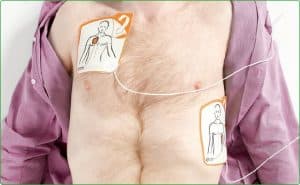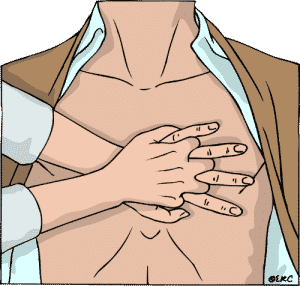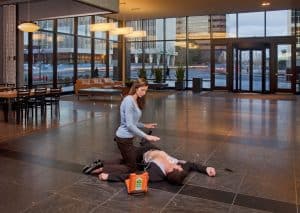You may often see, these strange yellow, green or white boxes on the walls, in train stations, airports, shopping centres, hotels, outside village halls, or in old telephone boxes, labelled AED.
These machines are designed to be used by anyone, in the event of a cardiac arrest, and will talk the user through what to do, should somebody collapse and not breathing. They are simple and easy to use, and will not allow you to deliver a shock, if the patient has a normal heart beat.
When someone suffers from a cardiac arrest, the sooner they can be shocked by an AED, the greater their chance of survival back to a normal life. With every minute that passes by, their chance of survival will diminish by between 10 and 12%. If we can shock the patient within the first three minutes after they collapse, their chance of survival increases to around 80%.
If the patient is not breathing, or not breathing normally, open the machine, it will turn on, and a voice will give you instructions, as to what you should do.
Firstly, remove all of the clothing from the patients chest. Then apply the pads. One on the top right of the chest and one on the bottom left.

The machine will then analyse. It is looking for a shockable rhythm. If it finds one, it will tell you to deliver the shock, by pressing the button, if it does not find a shockable rhythm, it will tell you to commence chest compressions.

Many machines have a metronome to help you with the speed of compressions, so do not be alarmed if you hear a rhythmic pinging noise.
It will get you to deliver chest compressions for two minutes and then it will analyse again, to see if it can find a shockable rhythm. It will then continue to repeat this two minute cycle.

If after you have delivered a shock, your patient begins to breath, you can then switch the machine off and place the patient into the recovery position, while you wait for the ambulance to arrive. You will need to monitor the patients breathing, as they might suffer from another cardiac arrest.
Remember, no-one has ever been sued for administering first aid, and the worst thing you can do, is to do nothing.
If you would like some first aid training in relation to these and other conditions, please do not hesitate to contact Passion First Aid on 01452 446020, email enquiries@passionfirstaid.co.uk, or go to our website, www.passionfirstaid.co.uk
